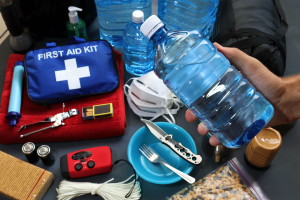The Ultimate Guide to Building a Disaster Kit: Essentials and Must-Haves
June 19, 2023 by admin
Filed under Disaster Kits, General Emergency Supplies
Preparing for a disaster is essential to protect yourself and your loved ones. Building a well-stocked and comprehensive disaster kit is a crucial step towards being prepared. In this guide, we will provide practical tips, actionable advice, and reliable resources to help you build the ultimate disaster kit.
- Start with the Basics:
- Water Storage: Aim to store at least one gallon of water per person per day for a minimum of three days. Consider adding water purification tablets or a water filtration system.

- Long Term Food: Opt for non-perishable items like canned goods, granola bars, and dried fruits. Don’t forget a manual can opener.
- Medications and First Aid: Include a well-stocked first aid kit, prescription medications, and any necessary medical supplies.
- Shelter and Clothing:
- Shelter: Have a tent, sleeping bags, or emergency blankets to provide shelter during evacuation or emergencies.
- Clothing: Pack durable clothing suitable for various weather conditions, including rain gear, warm layers, and sturdy shoes.
- Tools and Supplies:
- Flashlights and Batteries: Keep several flashlights with extra batteries readily available.
- Multi-Tools: A versatile tool that combines various functions like pliers, a knife, and a screwdriver can be indispensable.
- Whistle and Signal Mirror: These can help attract attention if you’re lost or need to signal for help.
- Duct Tape and Plastic Sheeting: These items can be used for temporary repairs and improvisation.
- Cash: Keep a small amount of cash in case ATMs are unavailable during a disaster.
- Communication and Documentation:
- Battery-powered or Hand Crank Radio: Stay informed about the latest news and emergency updates.
- Cell Phone Charger: Have a portable charger or a solar-powered charger to keep your cell phone operational.
- Important Document Storage: Gather important documents like identification, insurance policies, and contact information in a waterproof container.
- Personal Hygiene and Sanitation:
- Personal Hygiene Items: Include items such as toothbrushes, toothpaste, hand sanitizer, and feminine hygiene products.
- Sanitation Supplies: Stock up on toilet paper, trash bags, and disinfectant wipes to maintain cleanliness.
- Additional Considerations:
- Pet Supplies: If you have pets, include food, water, medications, and any necessary documents.
- Entertainment and Comfort: Include books, playing cards, or other small games to keep spirits high during stressful times.
- Emergency Contact List: Write down important phone numbers and addresses in case your electronic devices are not accessible.
Reliable Resources:
- Ready.gov: The official website of the U.S. Department of Homeland Security provides comprehensive information on disaster preparedness.
- American Red Cross: Visit redcross.org for a wealth of resources, including emergency planning guides and first aid tips.
- FEMA: The Federal Emergency Management Agency offers valuable guidance on disaster preparedness and response at fema.gov.
Building a disaster kit is an essential step in preparing for emergencies. By following the practical tips, actionable advice, and utilizing reliable resources provided in this guide, you can create an ultimate disaster kit that will help you and your loved ones stay safe and resilient during challenging times. Remember to regularly check and update your kit to ensure its effectiveness. Being prepared is the key to successfully navigating through any disaster or emergency.








